Bitcoin
Japan’s Steady Rate Is Good for Bitcoin Investors, Experts Say

On August 7, the Bank of Japan (BOJ) Deputy Governor, Shinichi Uchida, announced that it would maintain low interest rates despite ongoing financial and capital market turbulence.
He mentioned that it is essential to continue with the current level of monetary easing.
Economic Turbulence Spurs BOJ’s Low-Rate Strategy
At the Financial and Economic Forum in Hakodate City, Uchida detailed the economic challenges prompting this decision. He highlighted the rapid depreciation of the dollar and a global decline in stock prices. Uchida attributed these trends to fears of a US economic slowdown.
“We took into consideration the fact that import prices have started to rise again due to the weak yen. This is a more risk-neutral measure, as it is a risk factor that could cause consumer prices to rise,” he explained.
Read more: How to Protect Yourself From Inflation Using Cryptocurrency
The yen-to-dollar exchange rate’s significant volatility has caused a noticeable decline in Japanese stock prices relative to other countries. Uchida noted that such fluctuations in stock prices directly affect personal consumption, corporate investment behavior, and the broader economic outlook.
Separately, Arthur Hayes, co-founder of the BitMEX crypto exchange, has provided insights into Japan’s current economic situation and monetary policy. According to Hayes, Japan’s low interest rates make it an attractive environment for a financial strategy known as the “carry trade.”
A carry trade involves borrowing a currency with a low interest rate, such as the yen, and using it to buy financial assets in another currency that yield higher returns. This strategy can be profitable if the borrowed currency depreciates, as the debt becomes cheaper to repay. Conversely, it can be costly if the borrowed currency appreciates.
“Some investors hedge the currency risk; some do not. In this case, because the BOJ can print an infinite amount of yen, there is no need for Japan Inc. to hedge its borrowed yen. Japan Inc. refers to the BOJ, corporations, households, pension funds, and insurance companies. Some entities are public, some are private, but they all act together to better Nippon, or at least they intend to,” Hayes wrote in his latest blog post.
Arthur Hayes Explains Japan’s Carry Trade Opportunity for Bitcoin Investors
He argues that this creates a favorable environment for investing in high-risk assets like Bitcoin. The steady depreciation of the yen, fueled by the BOJ’s monetary policies, makes Bitcoin an attractive investment for those seeking higher returns and wealth protection.
This economic context aligns with the move from Japanese investment firm Metaplanet, which has consistently purchased Bitcoin since April. BeInCrypto reported that this strategy is influenced by the desire to reduce risks tied to Japan’s economic environment. By adopting Bitcoin as a reserve asset, Metaplanet aims to reduce its exposure to the yen.
In the latest development, on August 6, Metaplanet revealed its plan to issue free stock acquisition rights to raise 10.08 billion JPY (about $70 million). This initiative allows all common shareholders to buy Metaplanet stock from September 6 to October 15 at a predetermined price under the company’s eleventh series of stock acquisition rights.
Read more: Who Owns the Most Bitcoin in 2024?
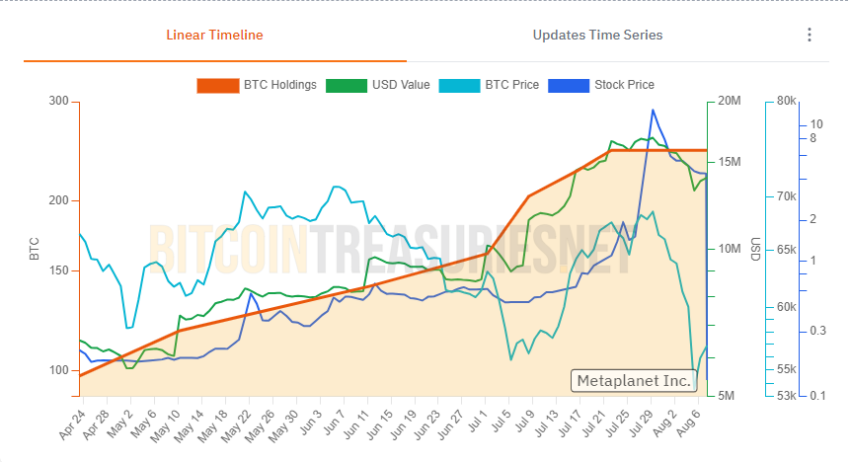
Metaplanet will allocate 8.5 billion JPY (approximately $58.76 million) from this offering to purchase more Bitcoin. According to the latest data, Metaplanet currently holds 246 BTC, valued at around $13.98 million.
Disclaimer
In adherence to the Trust Project guidelines, BeInCrypto is committed to unbiased, transparent reporting. This news article aims to provide accurate, timely information. However, readers are advised to verify facts independently and consult with a professional before making any decisions based on this content. Please note that our Terms and Conditions, Privacy Policy, and Disclaimers have been updated.
Bitcoin
Institutional Risk Aversion Drives $218 Million Bitcoin ETF Outflows
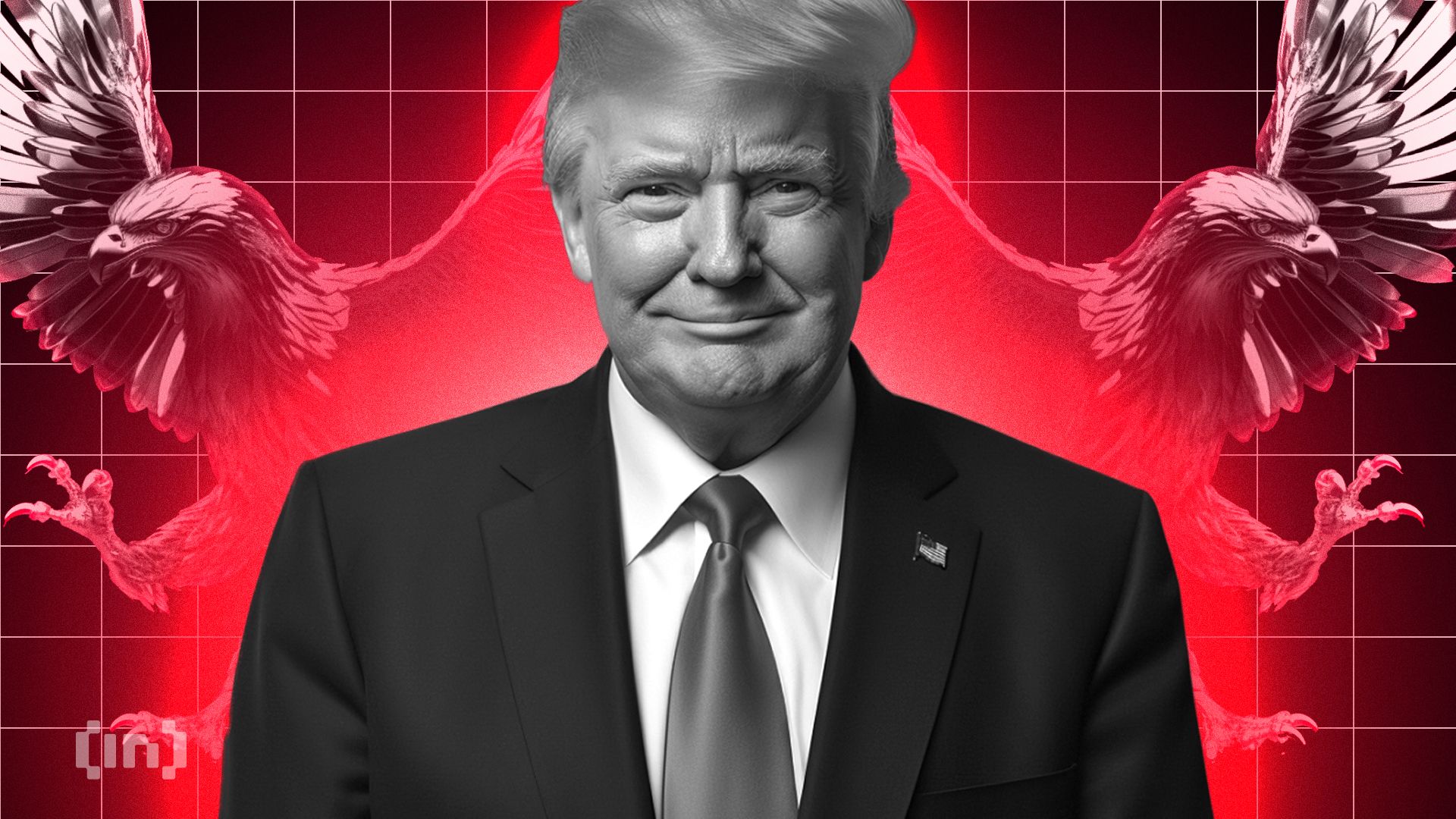
Bitcoin ETFs (exchange-traded funds) continue to record negative flows this week as President Trump’s Liberation Day countdown continues.
Sentiment is cautious across crypto markets, with traders and investors adopting a wait-and-see approach.
Bitcoin ETF See Outflows Amid Investor Caution
Data on Farside Investors shows two consecutive days of net outflows for Bitcoin ETFs since Monday. Financial instruments from Bitwise (BITB), Ark Invest (ARKB), and WisdomTree (BTCW) were in the frontline for Monday’s $60.6 million outflows, with only BlackRock’s IBIT seeing positive flows.
Meanwhile, Tuesday saw even more outflows, approaching $158 million, with Bitwise and Ark Invest leading the charge. Then, on April 1, BlackRock’s IBIT recorded zero flows. Meanwhile, Ethereum ETFs recorded net outflows of $3.6 million, data on Farside shows. This suggests a cautious sentiment among institutional investors.
“The Spot Bitcoin ETFs saw $157.8 million outflow yesterday. The Spot Ethereum ETFs saw a $3.6 million outflow. Institutions are reducing risk ahead of today’s tariff announcement,” analyst Crypto Rover noted.
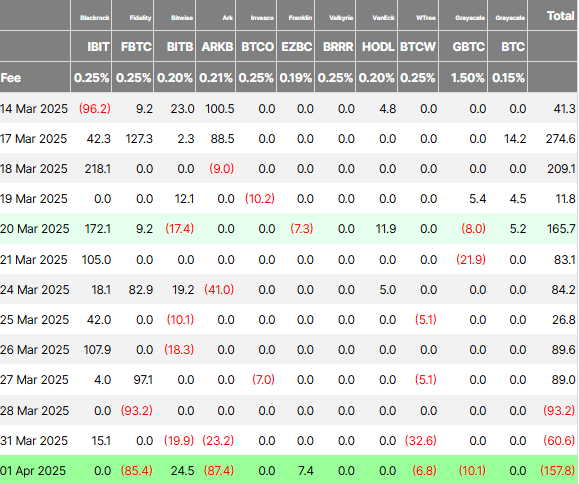
Indeed, sentiment suggests traders are exercising caution, choosing to remain in “wait-and-see” mode. The caution comes ahead of Trump’s Liberation Day announcement, which is due later in the day on April 2.
With POTUS poised to unveil sweeping new tariffs, traders and investors across financial playing fields wait to see the scope of an onslaught that could spark a global trade war. Specifically, there is generally very little information about the tariffs’ specifics, which creates uncertainty regarding their impact on the broader economy and the crypto market.
“The White House has not reached a firm decision on their tariff plan,” Bloomberg reported, citing people close to the matter.
Despite the lack of clarity, it is understandable why investors would be cautious considering the impact of previous tariff announcements on Bitcoin price. Meanwhile, analysts predict extreme market volatility, with potential stock and crypto crashes reaching 10-15% if Trump enforces broad tariffs.
“April 2nd is similar to election night. It is the biggest event of the year by an order of magnitude. 10x more important than any FOMC, which is a lot. And anything can happen,” economic analyst Alex Krüger predicted.
While sentiment is cautious in the crypto market, some investors are channeling toward gold as a safe haven. A Bank of America survey showed that 58% of fund managers prefer gold as a trade war safe haven, while only 3% back Bitcoin.
These findings came as institutional investors cite Bitcoin’s volatility and limited crisis-time liquidity as key barriers to its safe-haven adoption. Trade tensions have historically driven capital into safe-haven assets.
With Trump’s Liberation Day announcement looming, investors preemptively position themselves again, favoring gold over Bitcoin.
Nevertheless, despite Bitcoin’s struggle to capture institutional safe-haven flows, its long-term narrative remains intact. This is seen with Bitcoin supply on exchanges dropping to just 7.53%, the lowest since February 2018.
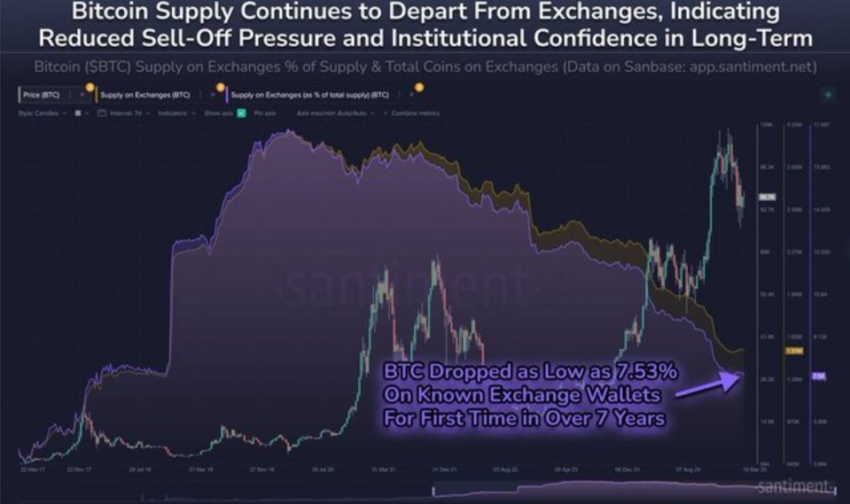
When an asset’s supply on exchanges reduces, investors are unwilling to sell, suggesting strong long-term holder confidence.
Disclaimer
In adherence to the Trust Project guidelines, BeInCrypto is committed to unbiased, transparent reporting. This news article aims to provide accurate, timely information. However, readers are advised to verify facts independently and consult with a professional before making any decisions based on this content. Please note that our Terms and Conditions, Privacy Policy, and Disclaimers have been updated.
Bitcoin
Bitcoin Could Serve as Inflation Hedge or Tech Stock, Say Experts

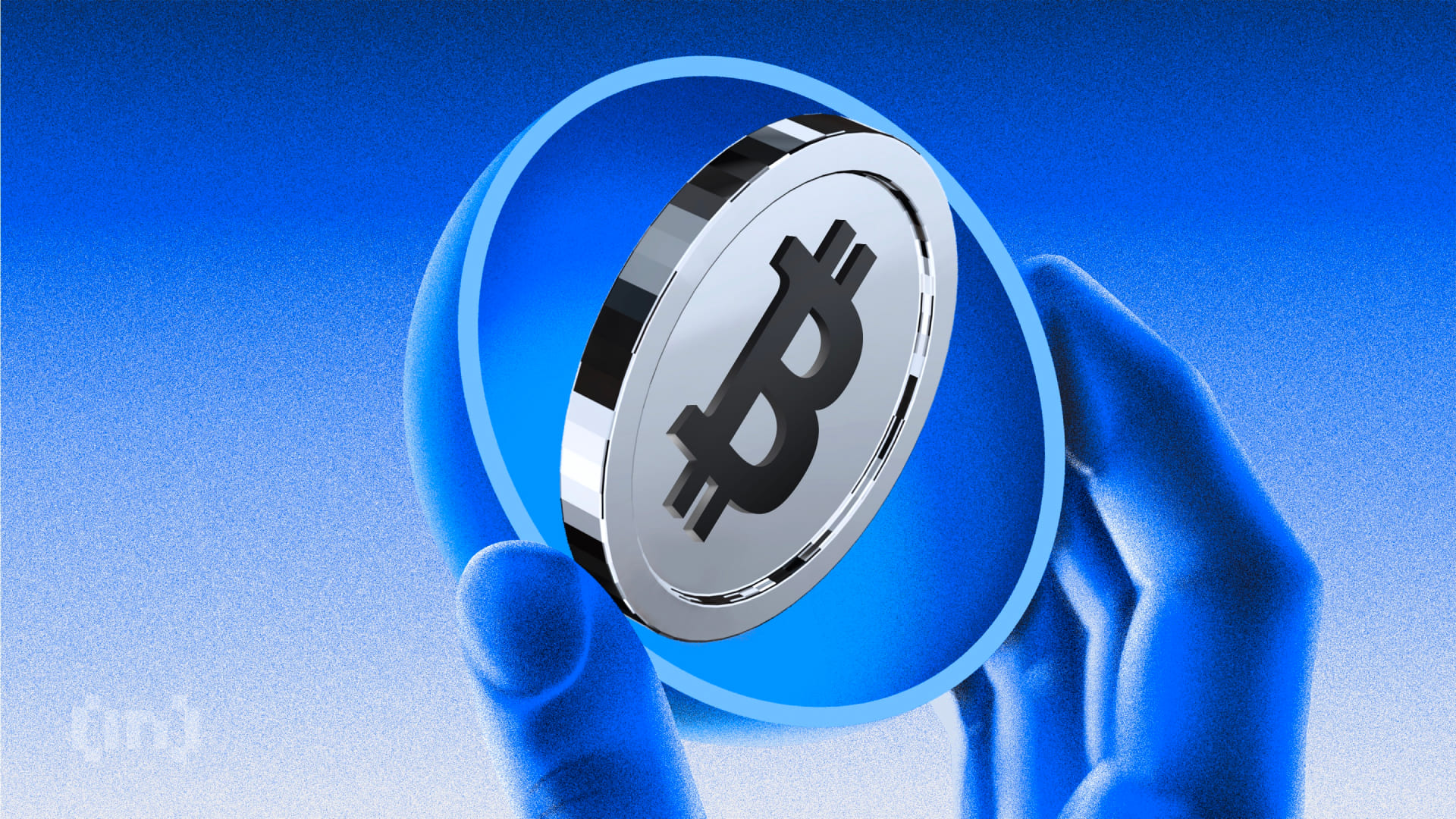
Bitcoin may be a useful hedge against inflation in the near future as market uncertainty is growing. In the long run, it may also be useful to envision Bitcoin differently, treating it as a barometer for the tech industry.
Standard Chartered’s Head of Digital Assets Research and WeFi’s Head of Growth both shared exclusive comments with BeInCrypto regarding this topic.
Bitcoin: Inflation Hedge or Magnificent 7 Candidate?
Since the early days of the crypto space, investors have been using it as a hedge against inflation. However, it’s only recently that institutional investors are beginning to treat it the same way. According to Geoff Kendrick, Head of Digital Assets Research at Standard Chartered, the trend of Bitcoin as an inflation hedge is increasing.
Still, this view may be too narrow in a few ways. Since the Bitcoin ETFs were first approved, BTC has been increasingly well-integrated with traditional finance. Kendrick noted this, saying that it is highly correlated with the NASDAQ in the short term. He claimed that Bitcoin might represent more than an inflation hedge, instead serving as an ersatz tech stock:
“BTC may be better viewed as a tech stock than as a hedge against TradFi issues. If we create a hypothetical index where we add BTC to the ‘Magnificent 7’ tech stocks, and remove Tesla, We find that our index, ‘Mag 7B’, has both higher returns and lower volatility than Mag 7,” Kendrick said in an exclusive interview with BeInCrypto.
This comparison is particularly apt for a few reasons. Tesla’s stock price is heavily entangled with Bitcoin, but it’s also been dropping due to political controversies. If Bitcoin were to replace Tesla’s position in the Magnificent 7, it may be a welcome addition. Of course, there is currently no mechanism to cleanly treat Bitcoin as a similar type of product. That could change.
However, Bitcoin’s role as an inflation hedge might be more immediately relevant. As Trump’s Liberation Day approaches, the crypto markets are becoming increasingly nervous about new US tariffs. As Agne Linge, Head of Growth at WeFi, said in an exclusive interview, these fears are impacting all risk-on assets, Bitcoin included.
“Crypto markets are closely tracking investor sentiment ahead of Trump’s…tariff announcement, with growing concerns over the potential economic impact. Bitcoin’s increasing correlation with traditional markets has amplified its exposure to broader macroeconomic trends, making it more sensitive to the risk-off sentiment that has affected equity markets,” Linge claimed.
She went on to state that US economic uncertainty was at record levels, surpassing both the 2008 financial crisis and the pandemic in April 2020. In these circumstances, recent inflation indicators are showing expected rates above expectations.
In such an environment, the crypto market is sure to take a hit, but traditional finance and the dollar is also in great jeopardy. All that is to say, Bitcoin is likely to be a solid inflation hedge in the near future. Even if it falls dramatically, it has worldwide appeal and the ability to rebound.
Disclaimer
In adherence to the Trust Project guidelines, BeInCrypto is committed to unbiased, transparent reporting. This news article aims to provide accurate, timely information. However, readers are advised to verify facts independently and consult with a professional before making any decisions based on this content. Please note that our Terms and Conditions, Privacy Policy, and Disclaimers have been updated.
Bitcoin
$500 Trillion Bitcoin? Saylor’s Bold Prediction Shakes the Market!


Michael Saylor, one of the most outspoken supporters of Bitcoin, is back and bolder than ever. In a recent statement, the former MicroStrategy CEO predicted that the alpha coin will potentially hit a $500 trillion market cap. Saylor’s bold prediction for the world’s top digital asset comes during the intensified push for a Strategic Bitcoin Reserve (SBR).
In his latest pro-crypto statement, Saylor argued that the digital asset will “demonetize gold”, then it will demonetize real estate, which he calculated as 10x more than gold. To summarize his argument, Saylor further states that Bitcoin will demonetize “all long-term store of value”.
Push For SBR Gains Ground
Saylor’s latest statement comes as Congress intensifies its efforts to build the country’s BTC holdings. United States President Donald Trump formalized the plans to build crypto holdings through an executive order to establish a strategic crypto reserve that will initially include $17 billion worth of BTC that the country currently controls.
Michael Saylor: Bitcoin Headed to $500 Trillion 🚀₿
– At Digital Asset Summit, MicroStrategy’s Saylor predicted:
• BTC will reach $500T market cap
• It will “demonetize gold, real estate & all long-term stores of value”
– Capital shift: “From physical to digital, from…— AFV GLOBAL (@afvglobal) March 28, 2025
According to the president, additional acquisitions of cryptocurrency are allowed, provided these are done through “budget-neutral” approaches. Senator Cynthia Lummis initially proposed in the Senate, through the Bitcoin Act, the plan to create a Bitcoin reserve. Under the proposal, the administration can purchase 1 million Bitcoin to complement the reserve.
Saylor Explains Crypto’s Role During Blockchain Summit
Saylor’s latest prediction on Bitcoin was made during his appearance at the DC Blockchain Summit. He was joined on stage by Jason Les, the CEO of Rito Platforms, and Lummis, the principal author of the Bitcoin Act.
During the program, Saylor was asked about America’s need for Bitcoin. Saylor answered with conviction, saying the rising importance of BTC is inevitable and will happen with the US’ participation. During his talk, he shared that Bitcoin, created by the enigmatic Satoshi Nakamoto, is unstoppable.
Image: Gemini Imagen
Saylor added that the premier digital asset is the next stage in money’s evolution, and it’s currently absorbing value from traditional assets like currency reserves and real estate.
Saylor Predicts Top Coin Will Reach $500 Trillion In Market Cap
During his talk, Saylor predicted that BTC will eventually grow from $2 billion to $20 billion, which can hit $200 billion and beyond. Finally, he thinks the asset can achieve a $500 trillion market capitalization, reflecting more than 29,000% increase from its current market capitalization of $1.67 trillion.
Saylor’s recent bold prediction aligns with his firm conviction and support for the asset. He argues that Bitcoin’s unique features, its decentralized nature and fixed supply, make it a perfect hedge against economic uncertainties like inflation.
Featured image from Gemini Imagen, chart from TradingView

Editorial Process for bitcoinist is centered on delivering thoroughly researched, accurate, and unbiased content. We uphold strict sourcing standards, and each page undergoes diligent review by our team of top technology experts and seasoned editors. This process ensures the integrity, relevance, and value of our content for our readers.
-

 Market21 hours ago
Market21 hours agoBitcoin Price Battles Key Hurdles—Is a Breakout Still Possible?
-

 Bitcoin19 hours ago
Bitcoin19 hours ago$500 Trillion Bitcoin? Saylor’s Bold Prediction Shakes the Market!
-
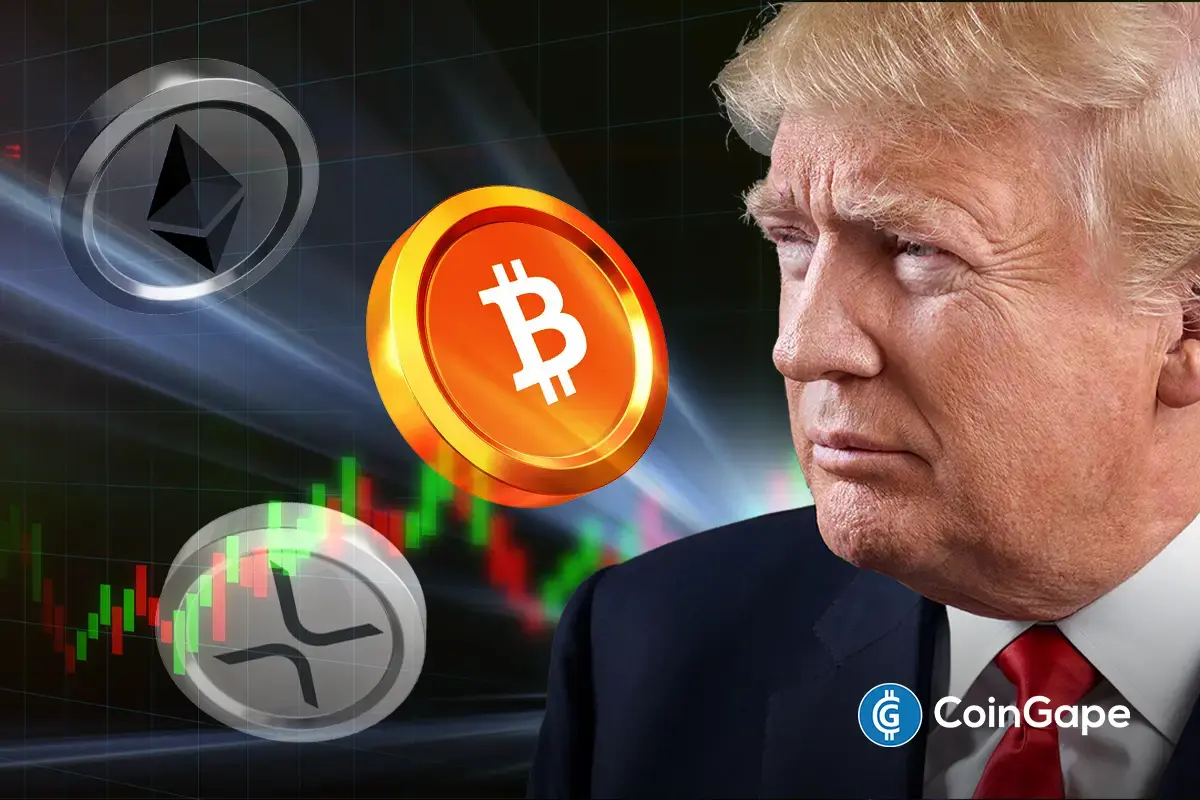
 Altcoin17 hours ago
Altcoin17 hours agoWill XRP, SOL, ADA Make the List?
-

 Market23 hours ago
Market23 hours agoXRP Bulls Fight Back—Is a Major Move Coming?
-

 Market22 hours ago
Market22 hours agoIs CZ’s April Fool’s Joke a Crypto Reality or Just Fun?
-
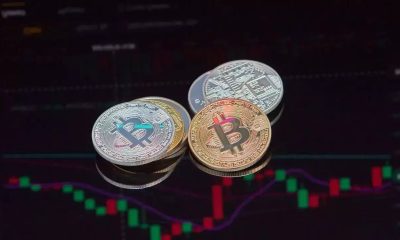
 Bitcoin20 hours ago
Bitcoin20 hours agoBig Bitcoin Buy Coming? Saylor Drops a Hint as Strategy Shifts
-

 Market18 hours ago
Market18 hours agoCoinbase Stock Plunges 30% in Worst Quarter Since FTX Collapse
-

 Market12 hours ago
Market12 hours agoEthereum Struggles to Break Out as Bear Trend Fades






















